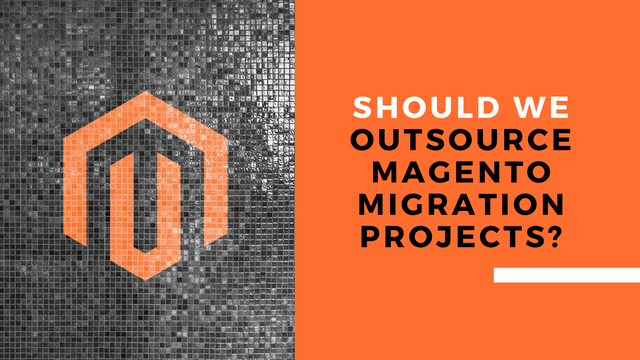
Recently, Magento officially announced that they would continue providing support for Magento 1 until June 2020; in other words, there will be no more Magento security patches after that time. At the same time, Magento released the latest version of Magento 2 (Magento 2.2.6) with plenty of enhancements and improvements. Due to the "dark future" of Magento 1 and the attractiveness of Magento 2, most of Magento store owners are considering Magento migration.
In order to migrate from Magento 1 to Magento 2, there are two possible solutions: letting/ hiring in-house developers to implement Magento migrations or outsourcing Magento migration projects for reliable agencies. Therefore, in this article, I will help the store owners to make a decision by analyzing two factors - the level of expertise required and cost of Magento migration.
Is Magento Migration Is Easy Or Complex To Carry Out?
A common misunderstanding is that Magento migration is as easy as upgrading from Magento 1.x.x to a higher version of Magento 1 (e.g.: from Magento 1.9.3.9 to 1.9.3.10). In fact, Magento 2 migration is immensely more complicated, which is a process of developing a new website from the scratch with some "materials" from the existing Magento 1 website. Here are the major components of Magento migration process:
- Theme migration: This is the very first thing we should concern when it comes to Magento migrations. There is no way to apply the current Magento 1 theme to a Magento 2 website due to code conflict. So, what is the solution? To deal with that, people often buy a new theme for Magento 2 and apply it in the new website. Another solution is to clone the existing Magento 1 site to make a similar one for Magento 2 but it definitely takes more time and effort.
- Data migration: It's is possible to migrate data from Magento 1 to Magento 2 by using the Magento data migration tool. You can migrate just a part or the whole database including products, orders, customers, CMS pages, URLs, and so on.
- Extension migration: Similar to the theme issue, we can't move Magento extensions to new Magento 2 e-commerce website. This also means that you buy all new modules and plugins for Magento 2. Moreover, it takes time to install those extensions from the beginning as well as to solve possible conflicts among them.
- Custom function migration: This is a 50-50 case. Some code might be migrated by using Magento code migration toolkit while others might be not. In the impossible cases, the developers must build a custom function for Magento 2 from the scratch.
- Site configuration: In the new Magento 2 website, you need to set up the new email templates, languages, currencies, shipping and payment methods, and so on. For the shipping carriers and payment gateways that are not provided by Magento 2 by default, you need to acquire API of them to integrate with the site.
Therefore, if your in-house Magento developers possess the required expertise, taking advantage of your human resource might be a good idea. However, if they lack experience in Magento migration, outsourcing your project is a better idea to ensure a successful transformation.
How Much Does It Cost To Implement Magento Migrations?
When it comes to the Magento migration cost, many merchants think about hiring offshore Magento development companies in Asia in order to save their budget. Owing to cheap labor cost ($20-50/working hour), Magento migration service providers in Vietnam, Singapore, Thailand, or India offer very reasonable pricing. In general, a project of migrating Magento 1 to 2 will cost from $2,500 to $10,000 based on its complexion. Meanwhile, you have to pay $75-150/working hour to have your work done by Magento agencies in the US, UK, Canada, etc.
In case that you hire in-house developers, the initial cost of talent acquisition might be high plus the monthly salary. Hence, if you have a strong financial capability, you can either outsource your project for any trusted Magento migration service provider worldwide or hiring in-house Magento coders. On the other hand, if you can't afford the high cost of Magento migrations charged by local firms, why don't you think of working with offshore Magento development agencies?
Conclusion
Hiring in-house Magento developers is an ideal solution only when your business possess experts in Magento migration and a big budget. Nevertheless, if you lack one of the above conditions, outsourcing is the first choice. There are a wide range of reputable Magento development companies that you can trust. Taking Tigren Solutions an example, they have more than 5 years of experience in Magento migration while offering very competitive pricing and 3 months of free support after completing the project. You can contact them to get a free quotation and consultation for your project.
@tigrensolutions, I gave you a vote!
If you follow me, I will also follow you in return!
Downvoting a post can decrease pending rewards and make it less visible. Common reasons:
Submit
Congratulations @tigrensolutions! You received a personal award!
Click here to view your Board
Do not miss the last post from @steemitboard:
Vote for @Steemitboard as a witness and get one more award and increased upvotes!
Downvoting a post can decrease pending rewards and make it less visible. Common reasons:
Submit